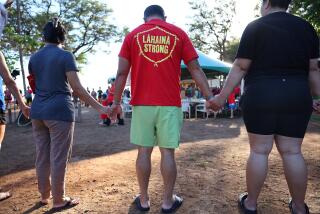An Island Favored by Tourists and Terrorists
- Share via
KUTA, Indonesia — The island of Bali, with miles of beaches and perfect waves, has long been marketed as a premier destination for tourists. Now this surfer’s paradise has a new distinction: the favorite resort island of terrorists.
The deadly assault on three restaurants last week was the second time in three years that the otherwise peaceful and isolated island had been targeted by suicide bombers. This time, some locals fear, Bali’s tourism industry may not quickly recover.
More than 200 people have been killed in terrorist attacks on the island, simply for being in a nightclub or a restaurant on a Saturday evening. Most of the victims were foreign tourists.
“People come here from all over the world, so the terrorists wanted to show the world their power by bombing Bali twice,” said Nyoman Adi Wiratama, who works in a clothing shop near two nightclubs that were blown up in 2002 and a restaurant that was bombed Oct. 1.
Bali has been so successful in promoting itself as a tourist destination that many foreigners don’t realize it is part of Indonesia, the world’s most populous Muslim country.
The island’s nearly 4 million people are predominantly Hindu. Authorities believe the latest attacks, like the earlier bombings, were carried out by Islamic extremists.
On Friday, Indonesian Vice President Jusuf Kalla called on Muslim leaders to condemn suicide bombings as a practice not in line with Islam.
“Suicide bombings in Afghanistan and Iraq are perhaps understandable because there is an ‘opponent’ there,” the vice president said, in an apparent reference to U.S.-led forces in both countries. “But here in Indonesia, it makes no sense. Why do they kill their own people, who have done nothing wrong?”
Bali derives about 80% of its revenue from tourism, industry officials say. The island’s economy suffered a serious blow when visitors stopped coming after the nightclub bombings that killed 202 people in Kuta, a beach town with narrow streets full of small shops, restaurants and bars.
Tourists gradually returned to Bali and business had almost recovered when terrorists struck again, this time targeting three restaurants. Twenty-two people were killed, including the three bombers, in the attacks in Kuta and Jimbaran Beach, another popular holiday spot 18 miles south.
Some tourism officials worry that the latest attacks will be more damaging to the industry, even though the death toll was much lower.
“The number of victims is smaller, but the impact is greater because it happened for the second time,” said Ben Sukma, chairman of the Travel Agents Assn. of Indonesia. “We believe it will take longer to recover than from the first bombing.”
It may not help the tourism industry that cafe owners in Jimbaran Beach, where two of the bombers struck, ignored warnings a month ago to increase security.
Police Capt. D. Dharmada said restaurant owners along Jimbaran Beach had been told to post security guards to search customers’ cars and bags after police found a partially assembled bomb at a hotel in Kuta last month.
But the owners delayed implementing the plan, he said, because they did not want to deter customers ahead of a major Balinese holiday on Oct. 4. The bombers struck three days before the festival.
“If those measures had been implemented, this attack probably wouldn’t have happened,” Dharmada told Associated Press. “I’m disappointed. Security is very important, and the loss here is so big. It’s a big sacrifice.”
Terrorism experts say they believe that a militant faction of Jemaah Islamiah is behind the restaurant bombings. The extremist group, which was closely tied to Al Qaeda before the arrest of key figures in both organizations, also is believed responsible for the 2002 nightclub attacks, the 2003 strike on the JW Marriott Hotel in Jakarta and the 2004 bombing of the Australian Embassy, also in the Indonesian capital.
Police are hunting nationwide for the group’s alleged master bomb maker, Azahari Husin, and his accomplice Noordin Mohammed Top, both Malaysians.
In the restaurant attacks, the three suicide bombers, thought to be in their early 20s, have not been identified, police say. Investigators have shown photos of their severed heads to terrorists convicted in previous bombings, but no one seemed to recognize them.
It appears the bombers were relatively new recruits, perhaps from remote villages, who were kept in seclusion as they underwent an intense period of indoctrination and preparation for the attacks.
After the restaurant bombings, many tourists fled the island. Qantas Airlines added extra flights to take Australian tourists home. But the exodus was not as great as after the 2002 attack. And although the nightclubs have been nearly empty, there have been more tourists on the streets of Kuta during the day than after the 2002 bombing.
Tourism officials say, however, that the test for Bali will be whether people who had made reservations will still come; some already have canceled.
Some industry representatives are optimistic that travelers are savvier than three years ago and willing to take the risk.
“I think that we live in a new normal, and I think the consumer and the traveler is much more resilient to crisis,” said Peter Semone, vice president of the Pacific Asia Travel Assn.
Nearly every Balinese family has someone working in the tourism business. Many lost jobs in 2002 and only recently have gone back to work. They are sad, angry and worried about their future.
Made Bona, 60, who sells paintings around the corner from the bombed Raja’s restaurant in Kuta, said he could not comprehend the motive for the attacks.
“Maybe they hate Bali that much,” he said. “But they are immoral. They don’t have hearts. Their nature is evil. They hate people. Balinese are not like that.”
Many Balinese believe the bombers would have been deterred had those convicted and sentenced to death for the 2002 bombings been executed by now.
“I don’t know what we’ve done wrong that these people bomb us twice,” said Made Rusmiani, 38, who owns a clothing shop in Kuta. “I feel angry toward these bombers. I hate them. They have to be eliminated.”
Since the first bombing, shops in Bali have been selling a T-shirt that says on the front, “Terrorism Won’t Stop Me,” and on the back, “Osama Don’t Surf.” It sums up the attitude of the surfers who come here from all over the world.
“If he was a surfer, he wouldn’t put bombs here,” said Chris Parson, 28, a surfer from Canada who was buying two of the shirts from a shop in Kuta. “If he was a surfer, then he would appreciate this place.
“I feel sad for people who live here,” he said. “The tourists are scared and probably aren’t going to come back anymore. But I will come back. The terrorists put these bombs in these places in order to scare people away. If I decided not to come back, then the terrorists would win. We can’t allow them to do that.”
Dinda Jouhana of The Times’ Jakarta Bureau contributed to this report.
More to Read
Sign up for Essential California
The most important California stories and recommendations in your inbox every morning.
You may occasionally receive promotional content from the Los Angeles Times.













